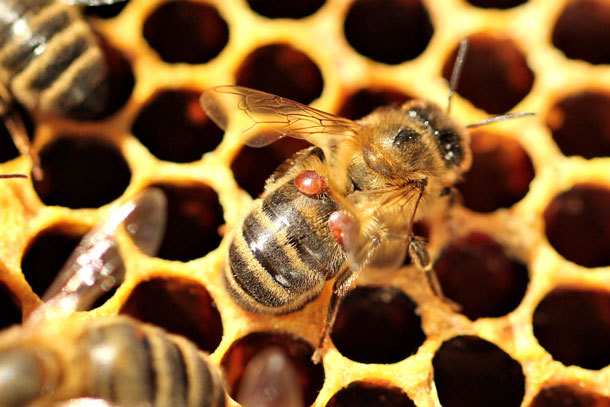Science Note: Using Mushrooms to Save The Bees
Air Date: Week of March 1, 2019

Varroa mites are the tiny parasites that transmit the Deformed Wing virus to bees, thereby giving them shrunken wings and preventing them from flying. (Photo: AbsoluteFolly, Flickr, CC BY-NC-ND 2.0)
A single Varroa mite can bring down an entire honeybee hive by infecting an individual bee with the Deformed Wing Virus. But researchers are now seeing that certain mushroom extracts can be used to treat these infected bees, as Aynsley O’Neill reports in this week’s Note on Emerging Science.
Transcript
[SCIENCE NOTE THEME]
O’NEILL: Deformed Wing virus has resulted in the deaths of billions of bees around the world.
As the name indicates, the virus gives bees shrunken, misshapen wings, which prevents them from flying, and essentially cuts their lifespans in half.
Although the parasitic mite that causes the virus is no more than 2 millimeters in length, it can take down an entire hive by infecting just one bee that transmits the virus to its hive mates.
Even worse, if a sick bee visits a flower, it can transfer the disease to any other bees that come in contact with that plant in the future.
But now a team of scientists has discovered an unexpected potential cure: mushrooms.
After seeing that bees tend to drink water droplets from fungi, a team of scientists theorized that the bees might be doing more than just hydrating.
Amadou and reishi mushrooms have both been used in traditional medicines, but this is the first time researchers have investigated their antiviral properties as a potential cure for Deformed Wing virus.
When bees consumed mushroom extracts in lab experiments, they had an 800-fold decrease in the levels of the Deformed Wing Virus in their systems.
Even in difficult-to-control field experiments, scientists observed an 80-fold reduction in the virus levels after treating hives with the reishi extract.
Now, these scientists are scaling up their experiment by conducting tests in hundreds of beehives throughout the state of Oregon.
That’s this week’s note on emerging science. I’m Aynsley O’Neill.
[SCIENCE NOTE THEME]
Links
Read about this research in the article in Nature
Living on Earth wants to hear from you!
Living on Earth
62 Calef Highway, Suite 212
Lee, NH 03861
Telephone: 617-287-4121
E-mail: comments@loe.org
Newsletter [Click here]
Donate to Living on Earth!
Living on Earth is an independent media program and relies entirely on contributions from listeners and institutions supporting public service. Please donate now to preserve an independent environmental voice.
NewsletterLiving on Earth offers a weekly delivery of the show's rundown to your mailbox. Sign up for our newsletter today!
 Sailors For The Sea: Be the change you want to sea.
Sailors For The Sea: Be the change you want to sea.
 The Grantham Foundation for the Protection of the Environment: Committed to protecting and improving the health of the global environment.
The Grantham Foundation for the Protection of the Environment: Committed to protecting and improving the health of the global environment.
 Contribute to Living on Earth and receive, as our gift to you, an archival print of one of Mark Seth Lender's extraordinary wildlife photographs. Follow the link to see Mark's current collection of photographs.
Contribute to Living on Earth and receive, as our gift to you, an archival print of one of Mark Seth Lender's extraordinary wildlife photographs. Follow the link to see Mark's current collection of photographs.
 Buy a signed copy of Mark Seth Lender's book Smeagull the Seagull & support Living on Earth
Buy a signed copy of Mark Seth Lender's book Smeagull the Seagull & support Living on Earth

